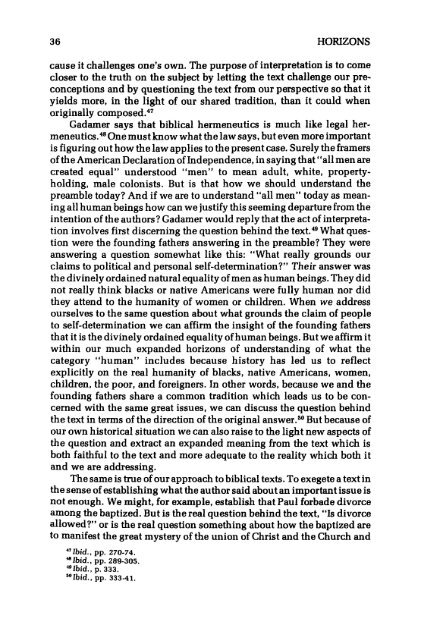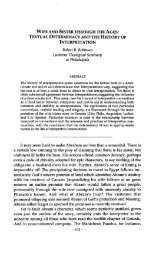FROM EXEGESIS TO HERMENEUTICS - Rice School of Pastoral ...
FROM EXEGESIS TO HERMENEUTICS - Rice School of Pastoral ...
FROM EXEGESIS TO HERMENEUTICS - Rice School of Pastoral ...
Create successful ePaper yourself
Turn your PDF publications into a flip-book with our unique Google optimized e-Paper software.
36 HORIZONScause it challenges one's own. The purpose <strong>of</strong> interpretation is to comecloser to the truth on the subject by letting the text challenge our preconceptionsand by questioning the text from our perspective so that ityields more, in the light <strong>of</strong> our shared tradition, than it could whenoriginally composed. 47Gadamer says that biblical hermeneutics is much like legal hermeneutics.48 One must know what the law says, but even more importantis figuring out how the law applies to the present case. Surely the framers<strong>of</strong> the American Declaration <strong>of</strong> Independence, in saying that "all men arecreated equal" understood "men" to mean adult, white, propertyholding,male colonists. But is that how we should understand thepreamble today? And if we are to understand "all men" today as meaningall human beings how can we justify this seeming departure from theintention <strong>of</strong> the authors ? Gadamer would reply that the act <strong>of</strong> interpretationinvolves first discerning the question behind the text. 49 What questionwere the founding fathers answering in the preamble? They wereanswering a question somewhat like this: "What really grounds ourclaims to political and personal self-determination?" Their answer wasthe divinely ordained natural equality <strong>of</strong> men as human beings. They didnot really think blacks or native Americans were fully human nor didthey attend to the humanity <strong>of</strong> women or children. When we addressourselves to the same question about what grounds the claim <strong>of</strong> peopleto self-determination we can affirm the insight <strong>of</strong> the founding fathersthat it is the divinely ordained equality <strong>of</strong> human beings. But we affirm itwithin our much expanded horizons <strong>of</strong> understanding <strong>of</strong> what thecategory "human" includes because history has led us to reflectexplicitly on the real humanity <strong>of</strong> blacks, native Americans, women,children, the poor, and foreigners. In other words, because we and thefounding fathers share a common tradition which leads us to be concernedwith the same great issues, we can discuss the question behindthe text in terms <strong>of</strong> the direction <strong>of</strong> the original answer. 50 But because <strong>of</strong>our own historical situation we can also raise to the light new aspects <strong>of</strong>the question and extract an expanded meaning from the text which isboth faithful to the text and more adequate to the reality which both itand we are addressing.The same is true <strong>of</strong> our approach to biblical texts. To exegete a text inthe sense <strong>of</strong> establishing what the author said about an important issue isnot enough. We might, for example, establish that Paul forbade divorceamong the baptized. But is the real question behind the text, "Is divorceallowed?" or is the real question something about how the baptized areto manifest the great mystery <strong>of</strong> the union <strong>of</strong> Christ and the Church and47 Ibid., pp. 270-74.48 Ibid., pp. 289-305.49 Ibid., p. 333.50 Ibid., pp. 333-41.



